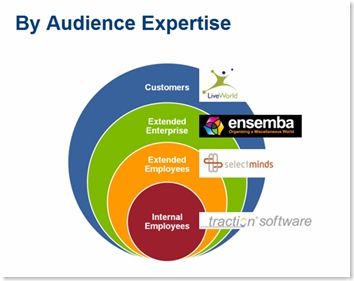I referred earlier to Bersin's new report on social networking and a little while ago, I attended their new principal analyst, David Mallon's webinar on the report.
Bersin's research contains a good overview of social networking tools / providers and of their variety. As Josh Bersin explains on his blog:
"Social networking software companies are sprouting up like weeds. We identified 90 such companies in our research, and more than 35 of them are somewhat focused on the corporate internal employee market.
Our initial research clearly shows that these companies fall into four categories: (A) software providers focused on corporate learning, HR, and collaboration systems and solutions (e.g. IBM, Microsoft-Sharepoint, Jive, Mzinga, Awareness, Q2 Learning, and others), (B) providers focused on external customer and public-facing collaborative networks like a company external blog (e.g. Lithium, Ning, Communispace, Telligent) (C) providers focused on content management systems, who have added on systems for collaboration (EMC, OpenText, Ektron, Alfresco) and (D) true application software companies who are adding collaboration and social networking to their systems (SuccessFactors, Saba, CornerstoneOndemand)."
I've previously discussed one example of (D) - SuccessFactor's ULTRA on my HCM blog.
Selection of the appropriate technologies can be made easier through the sort of categorisation that Bersin describe, for example:
- Size and scope
- Stand alone or ERP
- SaaS / hosted / installed
- By audience expertise:
In particular, Bersin usefully categorise tools into 4 Cs depending upon how they support conversations, connections, content and collaboration.
I think this is a useful classification and fits with a model I've been using that is itself based on Ross Dawson's web 2.0 landscape applied to an HR environment.
I've show how the two fit together below:





















No comments:
Post a Comment
Please add your comment here (email me your comments if you have trouble and I'll put them up for you)